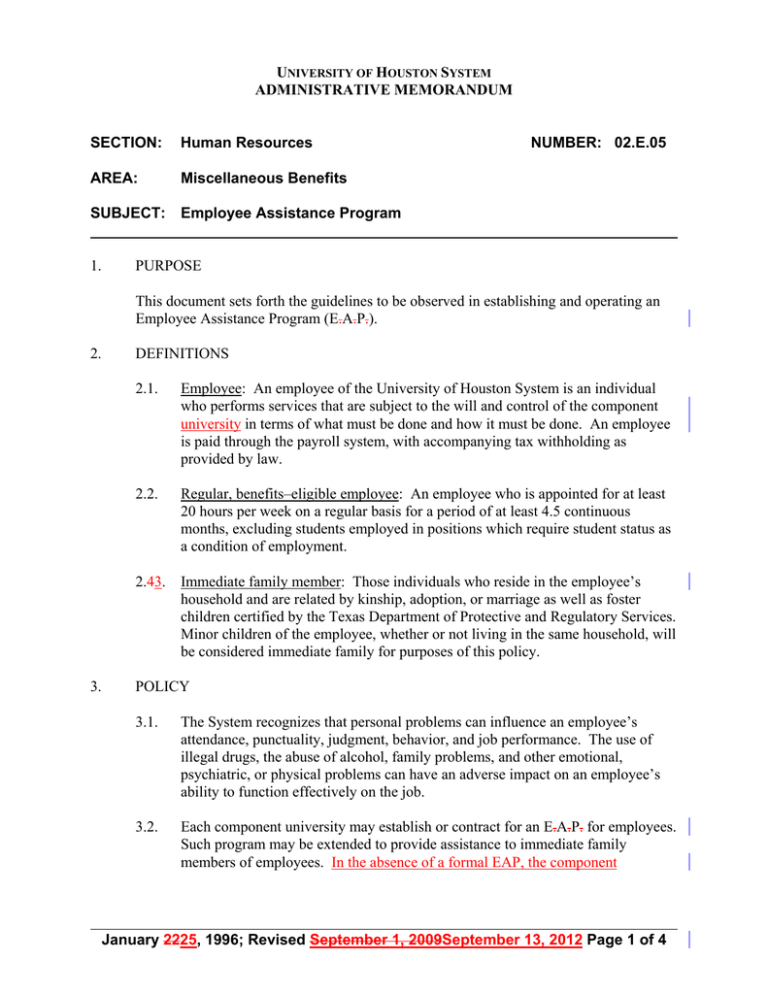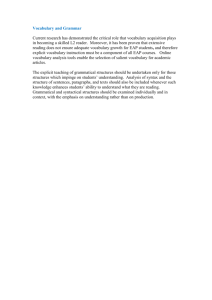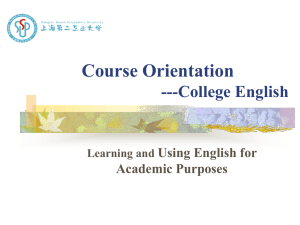
UNIVERSITY OF HOUSTON SYSTEM
ADMINISTRATIVE MEMORANDUM
SECTION:
Human Resources
AREA:
Miscellaneous Benefits
SUBJECT:
Employee Assistance Program
1.
NUMBER: 02.E.05
PURPOSE
This document sets forth the guidelines to be observed in establishing and operating an
Employee Assistance Program (E.A.P.).
2.
3.
DEFINITIONS
2.1.
Employee: An employee of the University of Houston System is an individual
who performs services that are subject to the will and control of the component
university in terms of what must be done and how it must be done. An employee
is paid through the payroll system, with accompanying tax withholding as
provided by law.
2.2.
Regular, benefits–eligible employee: An employee who is appointed for at least
20 hours per week on a regular basis for a period of at least 4.5 continuous
months, excluding students employed in positions which require student status as
a condition of employment.
2.43.
Immediate family member: Those individuals who reside in the employee’s
household and are related by kinship, adoption, or marriage as well as foster
children certified by the Texas Department of Protective and Regulatory Services.
Minor children of the employee, whether or not living in the same household, will
be considered immediate family for purposes of this policy.
POLICY
3.1.
The System recognizes that personal problems can influence an employee’s
attendance, punctuality, judgment, behavior, and job performance. The use of
illegal drugs, the abuse of alcohol, family problems, and other emotional,
psychiatric, or physical problems can have an adverse impact on an employee’s
ability to function effectively on the job.
3.2.
Each component university may establish or contract for an E.A.P. for employees.
Such program may be extended to provide assistance to immediate family
members of employees. In the absence of a formal EAP, the component
January 2225, 1996; Revised September 1, 2009September 13, 2012 Page 1 of 4
AM No. 02.E.05
university may contract with an external provider for professional services when
needed.
3.3.
4.
Participation in an E.A.P. will not be the basis for discrimination or retaliation
against any individual or group on the basis of race, gender, age, color, religion,
national origin, disability, sexual orientation or veteran status. Additionally, the
System prohibits discrimination in all aspects of employment on the basis of
sexual orientation, gender identity or gender expression.
POLICY PROVISIONS
4.1.
An E.A.P. should provide confidential professional assistance to help individuals
resolve problems that affect their personal lives or performance on the job. An
E.A.P. may include such services as assistance with marital and family problems;
referrals to community agencies, mutual help organizations, private hospitals,
public treatment programs; and drug and alcohol abuse counseling and
rehabilitation or referral to private drug treatment practitioners during or
following problem assessment. In addition, an EAP may provide assistance with
financial or legal issues or concerns.
4.2.
Generally, confidentiality is guaranteed to any employee who uses the services of
an E.A.P.. However, confidentiality may be suspended if in the judgment of the
professional E.A.P. staff or supervisory staff, an employee represents a threat to
self or to others, or if access to information is required in response to legal action.
Absent these conditions, a violation of confidentiality by any employee involved
in administration of the program may be grounds for disciplinary action, up to and
including dismissal from employment. Employees involved in administration of
the E.A.P. will not discuss the employee’s problem with supervisors, other
employees, or treatment providers, unless the employee provides written
authorization to release such information.
4.3.
Each component university having an established E.A.P. will provide information
materials describing the E.A.P., available services, and individuals eligible to use
those these services.
4.4.
An E.A.P. may supplements, but does not replace, the existing procedures for
dealing with deteriorating or unsatisfactory job performance or conduct.
Employees participating in an E.A.P. will be expected to meet existing job
performance standards and established work rules. As long as the employee's job
performance is acceptable and the employee abides by System and/or component
university rules and regulations, no disciplinary action will be taken whether or
not an employee chooses to accept the assistance offered through an E.A.P.
Regardless, s Standard disciplinary procedures will be followed if an employee’s
job performance is unsatisfactory, or if the employee violates policies.
January 2225, 1996; Revised September 1, 2009September 13, 2012 Page 2 of 4
AM No. 02.E.05
5.
6.
4.5
Mandatory management referrals to an EAP or external provider may be initiated
by the employee’s supervisor, in consultation with human resources, when the
employee’s conduct or performance may necessitate professional assistance.
4.56.
Absences from work resulting from participation in an E.A.P. will be handled in
accordance with established leave policies.
4.67
All records maintained by the E.A.P. staff will be kept in locked files which are
not part of the regular employee’s personnel files.
4.78
Fees and expenses incurred as a result of referrals to external agencies or
professionals are the responsibility of the employee.
REVIEW AND RESPONSIBILITY
Responsible Party:
Associateistant Vice Chancellor for Human ResourcesFinance
Review:
Every threefive years, on or before August 3December 1
APPROVAL
Approved:
John Rudley
Executive Vice Chancellor for Administration and Finance
Jay Gogue
Chancellor
Date:
May 25, 2005
REVISION LOG
Revision
Number
Approval
Date
Description of Changes
1
01/25/1996
Initial version
2
05/25/2005
Applied revised SAM template to meet current documentation
standards. Information was added to Section 3.3 that
participation in an EAP will not be the basis for discrimination or
retaliation against any individual or group on the basis of race,
gender, age, color, religion, national origin, disability, sexual
orientation or veteran status. Changed the responsible party to
AVC for Human Resources. Changed review period from
annually on or before September 1st to every three years on or
January 2225, 1996; Revised September 1, 2009September 13, 2012 Page 3 of 4
AM No. 02.E.05
before August 31st
3
TBD
Applied revised SAM template and added new Revision Log. In
Section 3.2, added information that the component university may
contract with an external provider for EAP professional services
in absence of a formal EAP. Added prohibiting of discrimination
on the basis of sexual orientation, gender identity or gender
expression in Section 3.3. Added EAP assistance for financial or
legal issues or concerns to Section 4.1. Revised Section 4.4
regarding the EAP supplementing the existing procedures dealing
with an employee’s deteriorating or unsatisfactory job
performance or conduct. Added Section 4.5 on the process of
referrals to the EAP by an employee’s supervisor in consultation
with human resources. Changed the responsible party to AVC for
Finance. Changed the review period from every three years on or
before August 31st to every five years, on or before December 1st
January 2225, 1996; Revised September 1, 2009September 13, 2012 Page 4 of 4


